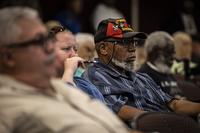Dear Sgt. Shaft:
My husband received DD256 when he was discharged from active duty in 1954. It is our understanding that the DD256 form is only for discharge from inactive reserves. He should have a DD214 from active duty according to our information. Could you please clarify? If he sends a copy his DD256 to the proper place, can he obtain the correct DD214?
Thank you,
Rosemary C.
Via the Internet
Dear Rosemary:
My sources tell me that a DD Form 256 is an honorable discharge certificate and counts as an authorized separation document. You didn’t state your intended use for the form. But if the form clearly states the dates of periods of active duty service, the document is valid for determining eligibility for veteran benefits. If you do need to request service documents, you can request them online at http://www.archives.gov/veterans/military-service-records or fax 314/801-9195, or write to: National Personnel Records Center, 1 Archives Drive, St. Louis, MO 63138.
You should request documents using a Standard Form 180 (which can be obtained from the website address above). If you write a letter you will need to include:
* The veteran’s complete name used while in service.
* Service number or social security number.
* Branch of service.
* Dates of service.
* Date and place of birth may also be helpful, especially if the service number is not known.
If the request pertains to a record that may have been involved in the 1973 fire, also include:
* Place of discharge.
* Last unit of assignment.
* Place of entry into the service, if known.
Shaft notes
• The Department of Veterans Affairs has announced the availability of the new online funeral directors resource kit. Funeral directors nationwide may use the kit when helping veterans and their families make burial arrangements in VA national cemeteries.
“We recognize that veterans and their families need compassion when they approach funeral directors for help,” said Secretary of Veterans Affairs Eric K. Shinseki. “We want to assist directors by giving them the information and tools they need to aid these families.”
The website — http://www.cem.va.gov/cem/funeraldirector.asp — was created to enable funeral directors to find the most pertinent information to help families plan burials and apply for VA memorial benefits quickly. It has links about eligibility, benefits and services plus videos and information regarding services offered with and without military funeral honors. The videos are available in English and Spanish.
VA maintains 3.2 million gravesites in 131 VA national cemeteries and has interred more than 118,000 veterans and family members in fiscal year 2012. Information on VA burial benefits can be obtained from national cemetery offices, from the Internet at www.cem.va.gov or by calling VA regional offices toll-free at 800/827-1000. To make burial arrangements at the time of need at a VA national cemetery, call the National Cemetery Scheduling Office at 800/535-1117.
• Kudos to Rep. Mike Michaud, Maine Democrat and ranking member of the House Veterans’ Affairs Committee, who has joined with Rep. Tim Walz, Minnesota Democrat, to introduce the CHAMPVA Children’s Protection Act, which would allow children eligible for medical care under the Civilian Health and Medical Program of the Department of Veterans Affairs (CHAMPVA) program to continue coverage up to age 26.
“This bill would bring CHAMPVA in line with the insurance requirements created by the Affordable Care Act,” Mr. Michaud said. “It will help close the coverage gap that currently exists for the children of veterans who gave up so much for our country.”
CHAMPVA is a comprehensive health care program in which the VA shares the cost of covered health care services and supplies with eligible beneficiaries, such as the spouse or child of a veteran who is disabled or died from a service-connected disability. Legislation has already been passed allowing TRICARE to cover children on their parents’ plan up to age 26.
• The American Legion announced the call for entries in its annual Fourth Estate Award program for excellence in journalism.
“The American Legion awards multiple prizes to recognize the outstanding achievements being made in print, broadcast and new media, or online (Internet-based) media,” said Robert L. Morrill, national chairman of the organization’s public relations commission. “The winner in each category will receive a $2,000 stipend to cover expenses and travel to accept the awards at the 2013 American Legion National Convention to be held in Houston, Texas, in August.” The deadline for 2013 submissions in all categories is Feb. 18.
An entry form and updated rules and information have been posted on the American Legion website at http://www.legion.org/presscenter/fourthestate. Send questions to pr@legion.org anytime.
Submissions are judged on the quality of reporting that the journalist believes produced a positive effect on society.
“We invite journalists who have made a difference for the better in their community, state or nation to send us their entry,” Mr. Morrill said. “There is no entry fee, and no single medium is limited as to the number of entries.”
Some past winners have included Newsweek Magazine, ABC News, Dateline NBC, USA Today and the Pittsburgh Tribune-Review. The complete list can be found on the American Legion website.
• U.S. Sen. Patty Murray, a senior member of the Health, Education, Labor and Pensions (HELP) Committee, attended a hearing titled “Assessing the State of America’s Mental Health System” where she questioned Pamela Hyde, J.D., administrator of the Substance Abuse and Mental Health Services Administration (SAMHSA), about the implementation of her mental health parity and access initiatives. The hearing also examined the most pressing problems in our mental health system, including a need to focus on prevention and early intervention, and discuss ways to improve access to services for those who need assistance.
As outgoing chairman of the Senate Committee on Veterans’ Affairs, Sen. Murray questioned Ms. Hyde on best practices and progress in implementing her Mental Health ACCESS Act, which will make improvements to ensure those who served have access to consistent, quality behavioral health care.
• Send letters to Sgt. Shaft, c/o John Fales, P.O. Box 65900, Washington, D.C. 20035-5900; fax 301/622-3330, call 202/257-5446 or email sgtshaft@bavf.org.










